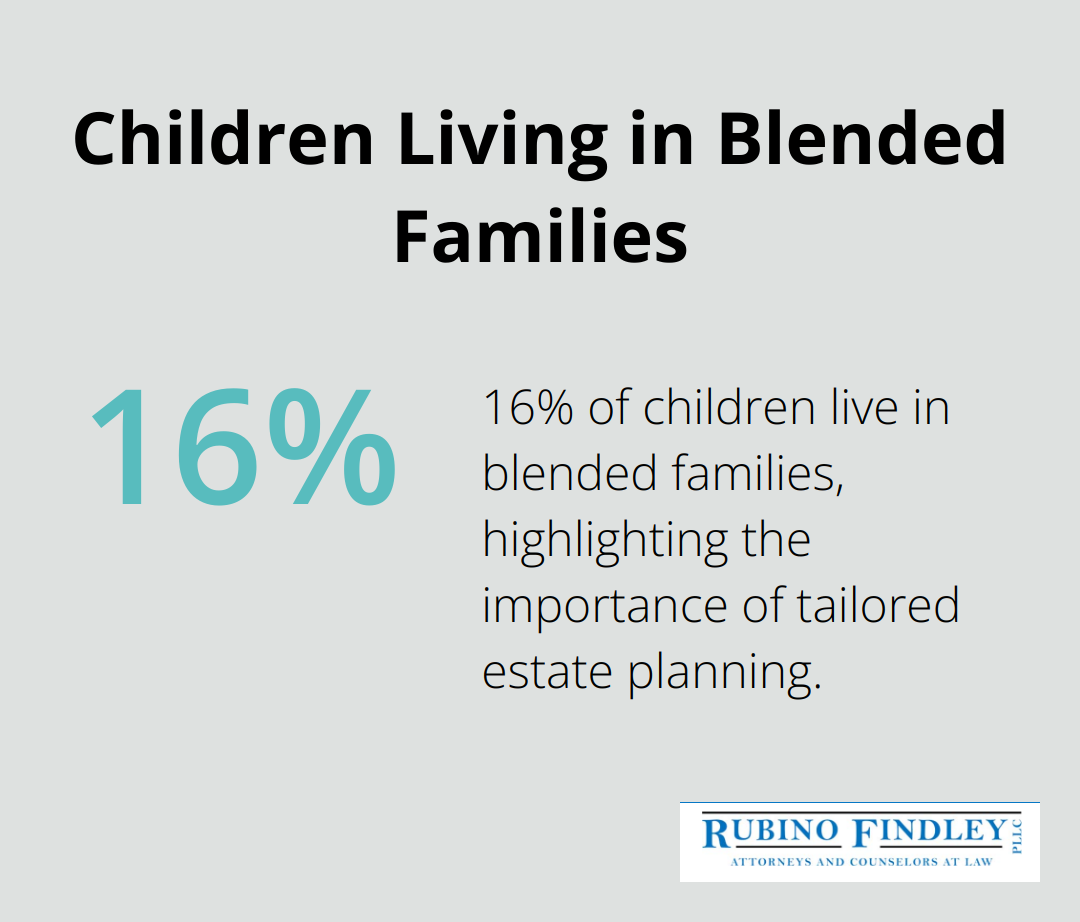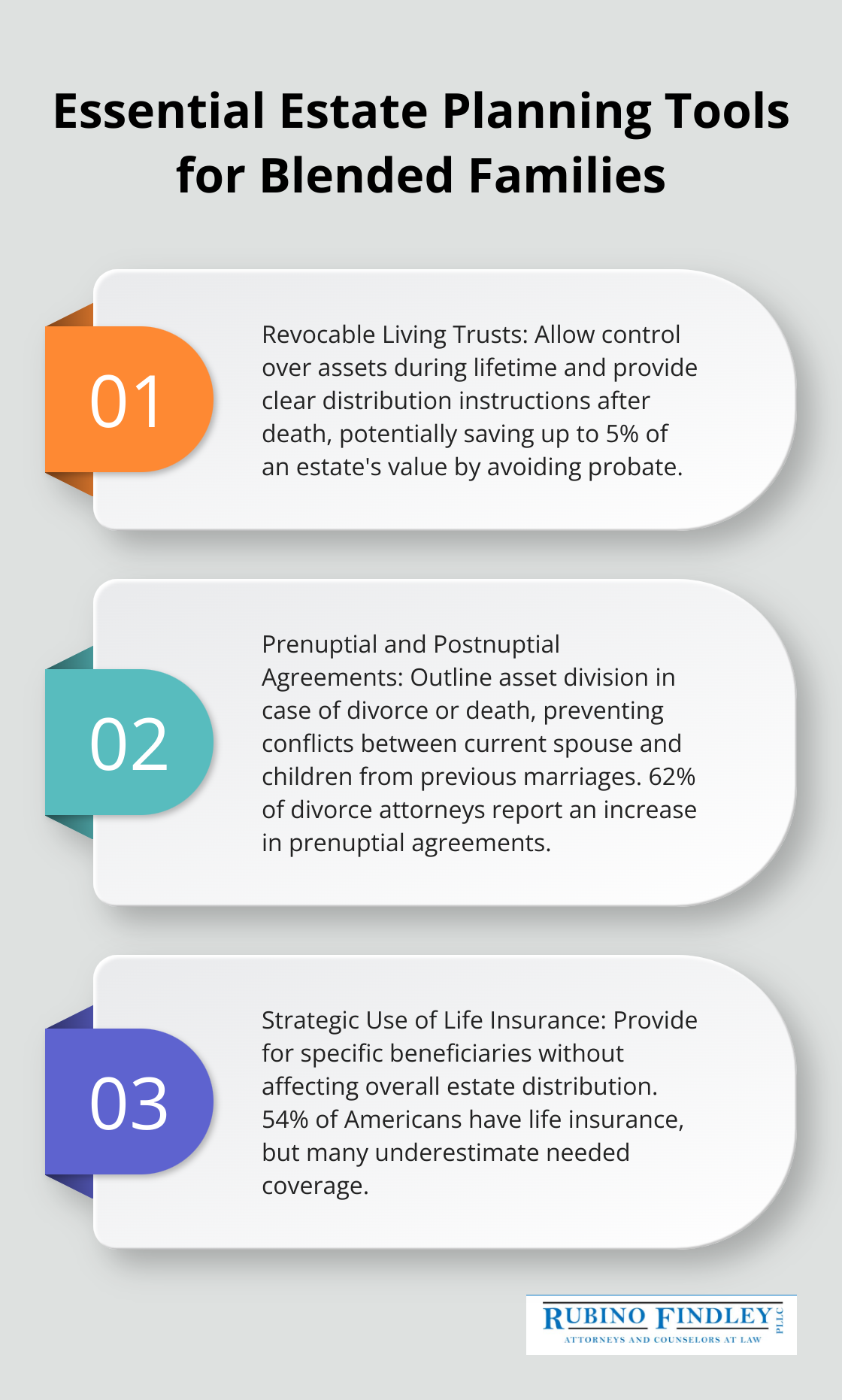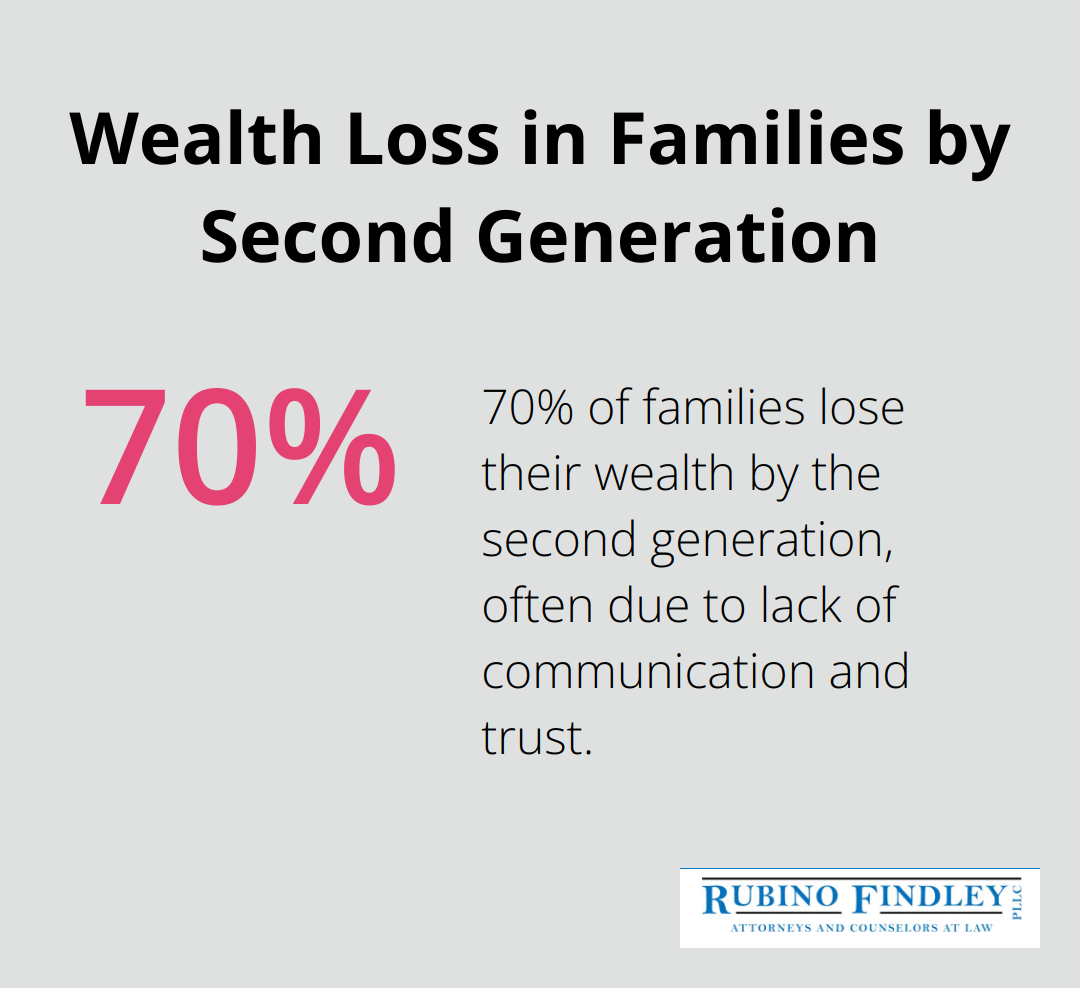Estate Planning Strategies for Blended Families in Boca Raton
Estate planning for blended families presents unique challenges in Boca Raton. With complex family dynamics and the need to balance multiple interests, it’s essential to have a well-crafted plan in place.
At Rubino Findley, PLLC, we understand the intricacies of protecting assets for biological children while providing for a current spouse. This blog post explores key strategies and tools to help blended families navigate the estate planning process effectively.
Why Are Blended Families Unique in Estate Planning?
Estate planning for blended families in Boca Raton presents a set of challenges that traditional families don’t typically face. The intertwining of stepchildren, ex-spouses, and new partners creates a complex web of relationships that require careful consideration.
Complex Family Dynamics and Potential Conflicts
In blended families, emotions often run high when it comes to inheritance. Children from previous marriages might fear exclusion, while new spouses may worry about their financial security. These concerns can lead to conflicts that tear families apart if not addressed properly in an estate plan.
A study by the Pew Research Center found that about 16% of children live in blended families. This statistic underscores the importance of tailored estate planning approaches for these unique family structures.

Balancing Needs of Current Spouse and Children from Previous Marriages
One of the trickiest aspects of estate planning for blended families involves ensuring fairness. The challenge lies in providing for your current spouse while also securing inheritances for children from a previous marriage. This balancing act requires careful consideration and often involves tools like Qualified Terminable Interest Property (QTIP) trusts.
QTIP trusts allow you to provide for your spouse during their lifetime while ensuring that the remaining assets pass to your children after your spouse’s death. This approach can help prevent unintended disinheritance of biological children.
Protecting Assets for Biological Children
Without proper planning, assets intended for biological children could end up in the hands of a stepparent or step-siblings. To prevent this, estate planning attorneys often recommend creating separate trusts for different branches of the family.
For example, you might establish one trust for your current spouse and another for your children from a previous marriage. This strategy helps ensure that your assets are distributed according to your wishes, regardless of future changes in family dynamics.
Legal Complexities and State Laws
Blended families often face unique legal complexities that can complicate estate and asset management. Florida’s laws surrounding Wills and Trusts are complex, and professional advice ensures compliance and alignment with personal wishes.
It’s important to note that under Florida law, step-children are not considered legal heirs (unless formally adopted). This means they do not automatically inherit from their stepparents without being specifically named in a will.
As we move forward, we’ll explore the key estate planning tools that can help blended families in Boca Raton navigate these unique challenges and create a comprehensive plan that protects all family members.
Essential Estate Planning Tools for Blended Families
Estate planning for blended families in Boca Raton requires a tailored approach. Several key tools can help protect your assets and ensure your wishes are carried out. Let’s explore these essential instruments that can make a significant difference in your estate plan.

Revocable Living Trusts
Revocable living trusts are powerful tools for blended families. They allow you to maintain control over your assets during your lifetime while providing clear instructions for distribution after your death. Unlike wills, trusts avoid probate, which saves time and money for your beneficiaries.
A study by the American Association of Retired Persons (AARP) found that probate costs can consume up to 5% of an estate’s value. The use of a revocable living trust can potentially save thousands of dollars for your heirs.
Prenuptial and Postnuptial Agreements
While not traditionally considered part of estate planning, prenuptial and postnuptial agreements play a vital role for blended families. These documents clearly outline how assets will be divided in case of divorce or death, which prevents potential conflicts between your current spouse and children from previous marriages.
A survey by the American Academy of Matrimonial Lawyers revealed that 62% of divorce attorneys reported an increase in prenuptial agreements over a three-year period. This trend underscores the growing recognition of these agreements as valuable planning tools.
Strategic Use of Life Insurance
Life insurance policies can effectively provide for specific beneficiaries without affecting the overall distribution of your estate. For example, you could name your children from a previous marriage as beneficiaries of a life insurance policy, while leaving other assets to your current spouse.
The Life Insurance Marketing and Research Association reports that 54% of Americans have some form of life insurance. However, many people underestimate the amount of coverage they need. Regular reviews of your policies will ensure they align with your current family situation and financial goals.
Qualified Terminable Interest Property (QTIP) Trusts
QTIP trusts offer a solution to the challenge of providing for both a current spouse and children from previous marriages. These trusts allow you to support your spouse during their lifetime while ensuring that the remaining assets pass to your children after your spouse’s death.
This approach helps prevent unintended disinheritance of biological children and provides a balance between the needs of different family members.
Separate Trusts for Different Branches of the Family
To protect assets for biological children, estate planning attorneys often recommend creating separate trusts for different branches of the family. You might establish one trust for your current spouse and another for your children from a previous marriage.
This strategy helps ensure that your assets are distributed according to your wishes, regardless of future changes in family dynamics. It also provides clarity and reduces the potential for conflicts among beneficiaries.
As we move forward, we’ll explore strategies to avoid common pitfalls in blended family estate planning, which will help you create a comprehensive plan that protects all family members and preserves harmony.
Navigating Pitfalls in Blended Family Estate Planning
Estate planning for blended families in Boca Raton requires careful navigation to avoid common pitfalls. Let’s explore some key strategies to sidestep potential issues.
Open and Honest Communication
One of the most effective ways to prevent future disputes is through clear, open communication with all family members. A study by the National Endowment for Financial Education found that 70% of families lose their wealth by the second generation, often due to lack of communication and trust. We recommend family meetings to discuss your estate plan.

During these meetings, explain your decisions and the reasoning behind them. This transparency can help prevent misunderstandings and reduce the likelihood of challenges to your will or trust after your passing. While these conversations can be difficult, they’re important for maintaining family harmony.
Regular Plan Reviews and Updates
Family dynamics change over time, and your estate plan should reflect these changes. We advise our clients to review their estate plans at least every three to five years (or after significant life events such as births, deaths, marriages, or divorces).
For example, if you remarry and have a child with your new spouse, you’ll likely want to update your plan to include provisions for this new family member. Failure to do so could lead to unintended consequences and potential legal battles among your heirs.
Selecting a Neutral Executor or Trustee
The right person to manage your estate is essential, especially in blended families where emotions can run high. A neutral third party, such as a professional fiduciary or trust company, can help ensure impartial administration of your estate.
According to a survey by TD Wealth, 44% of estate planning professionals cited family conflict as the biggest threat to estate planning. The selection of a neutral executor or trustee can significantly reduce the risk of family disputes over asset distribution.
Clear Asset Designation
In blended families, it’s particularly important to clearly designate which assets go to which beneficiaries. This clarity can prevent misunderstandings and potential conflicts after your passing. Try to be as specific as possible in your estate planning documents.
Consideration of Tax Implications
Estate planning for blended families often involves complex tax considerations. It’s important to structure your plan in a way that minimizes tax burdens on your heirs. This might involve strategies such as gifting during your lifetime or setting up specific types of trusts.
Final Thoughts
Estate planning for blended families requires a tailored approach to address unique family dynamics. The use of revocable living trusts, prenuptial agreements, and strategic life insurance policies helps create comprehensive plans that protect all family members’ interests. Regular reviews and updates of estate plans ensure they reflect evolving family situations and maintain fairness.
Open communication about estate planning intentions reduces the likelihood of future disputes among family members. The selection of a neutral executor or trustee (such as a professional fiduciary) can provide impartial administration of the estate. These steps contribute to preserving family harmony and ensuring the fair distribution of assets.
The complexities of estate planning for blended families highlight the need for professional guidance. Rubino Findley, PLLC can help you navigate this process and create a plan that protects your assets and honors your wishes. Take action now to secure your family’s future and provide clarity for your loved ones.

